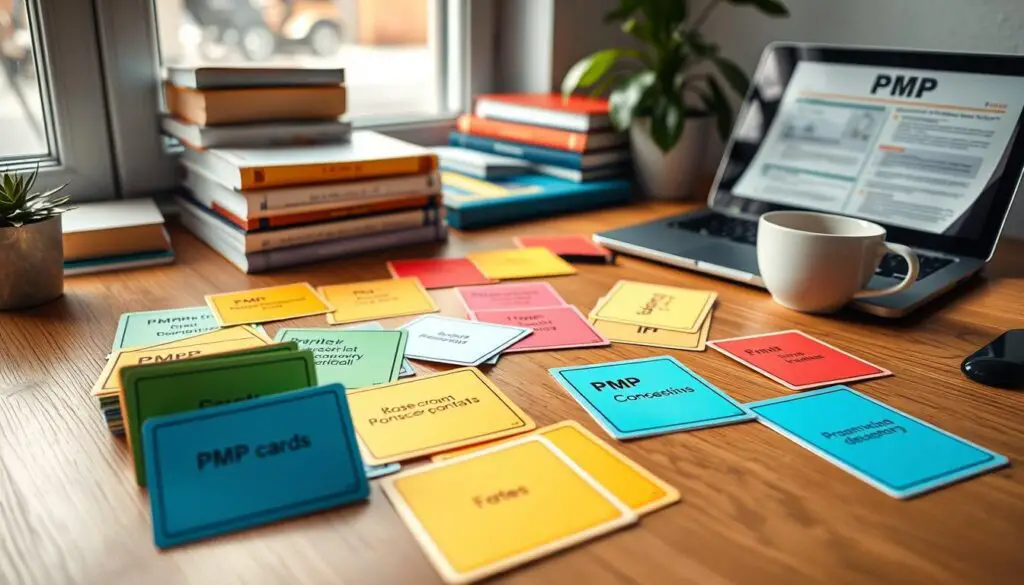The PMP certification is highly valued worldwide. It can greatly boost your career in project management. It not only proves your skills but also makes you more attractive in a competitive job market. To succeed, it’s key to prepare well for the PMP exam.
The exam has 200 multiple-choice questions. You need solid preparation to pass, as the success rate is around 60-70%. This guide offers tips and strategies to help you feel confident and ready for the exam.
It’s important to know the exam’s structure and what it requires. You need relevant project management experience and at least 35 hours of formal education from a PMI provider. By using these tips, you can make a study plan that fits you. This plan should include different resources and techniques to help you with the exam’s various question types.
This guide shares eight strategies for your study plan. From setting a realistic study timeline to using practice exams that feel like the real thing, each tip offers a new way to pass the PMP exam. As you study, keep these tips in mind. Remember, consistent practice and a clear study plan are your best friends on this path.
Understanding the Importance of PMP Certification
Gaining PMP certification is a big step in your project management career. It shows you have the skills and knowledge needed. This Project Management Certification makes you stand out in a competitive job market. It shows you’re ready for the job and preferred by employers.
PMI’s Earning Power Report shows PMP-certified people earn up to 25% more. This is a big financial advantage. The PMP certification is also recognized worldwide, making you a top choice for jobs. It opens doors to networking and professional growth through PMI membership.
The PMP exam has three main areas:
- People Domain: 42% focuses on team management, leadership, and communication.
- Process Domain: 50% tests technical aspects including scheduling, budgeting, and risk management.
- Business Environment Domain: 8% centers on aligning projects with organizational strategy and external influencing factors.
The latest PMBOK Guide focuses on delivering value, not just completing tasks. About 70% of PMP exam questions come from the PMBOK Guide. It’s key to study well and use different resources for PMP exam success.
| Certification | Annual Salary Increase | Pass Rate with Structured Study | Global Recognition |
|---|---|---|---|
| PMP Certified | 25% | 80% | Yes |
| Non-Certified | 0% | Less than 50% | No |
Knowing the importance of PMP certification and preparing well can boost your career and earnings.
Preparing Your Mindset for the PMP Exam
Starting your journey to pass the PMP exam means getting the right mindset. Seeing the exam as a step in your career growth is key. Every study session is an investment in your future.
Keep a growth mindset when preparing for the PMP exam. Write down your past project experiences and see how they relate. This helps solidify your knowledge and connects new ideas to what you already know.
Stay proactive and adjust your study methods to fit your learning style. This keeps you engaged and ready for any challenge.
The exam day can be stressful. But, by preparing your mind, you can reduce that stress. Start a study plan a few weeks before the exam. Focus on key topics like scope, schedule, and risk management.

Having a detailed study plan helps you stay focused and clear. A 30-day plan can be very effective:
| Week | Focus Areas |
|---|---|
| Week 1-2 | Core topics (scope, schedule, risk management) |
| Week 3 | Full-length practice exams |
| Week 4 | Test-taking strategies and expert sessions |
Mock exams help improve your endurance and time management. These skills are critical for the real test. With a good plan and the right study guide, you’ll feel confident on exam day. Thoughtful preparation builds knowledge and a strong mindset, essential for success.
8 Proven Strategies for Passing the PMP Exam: A Guide
Passing the PMP exam needs a solid plan. Using the right strategies can really help. Here are important things to keep in mind while studying.
Focusing on Exam Objectives
Knowing the Exam Objectives in the PMBOK Guide is key. Make your PMP Study Plan based on these to learn all you need. It’s like a guide, helping you focus on what’s most important.
Setting a Study Timeline
Make a Study Timeline that fits your life. Most people do best with 2 to 3 months of focused study. Break your study into short sessions. Studying for an hour a day is better than long, scattered sessions.
Use weekends for longer study times. Listen to or watch study materials on your way to work.
Identifying Strengths and Weaknesses
Do a PMP Exam Self-Assessment to see how well you know project management. This helps you find your Identifying Strengths and Weaknesses. Use practice exams to see where you need to improve.
Regular checks help you plan your PMP Exam Preparation Schedule better.

Diverse Study Resources for Effective Preparation
To prepare well for the PMP exam, you need a variety of study resources. Books and online courses offer different views and formats. This helps match your learning style. Using these resources will make you more ready and confident for the exam.
Utilizing Books and Online Courses
Finding good study materials is key to success. Here are some top picks:
- PMBOK Guide – The main guide for project management principles.
- PMP prep books – Look at books by Rita Mulcahy and Andy Crowe.
- Online courses – Sites like Udemy and LinkedIn Learning have study plans for the PMP exam.
Using these resources helps you understand PEOPLE, PROCESS, and BUSINESS ENVIRONMENT better. Try different formats like videos, audiobooks, and forums. This makes studying more effective for everyone.
Engaging with Practice Exams
Practice exams for PMP are essential to check your progress. Here’s how to use them:
- Initial Assessment – Start with a practice exam to find your strong and weak areas.
- Progress Tracking – Keep taking practice exams to see how you’re improving.
- Mock Simulations – Use test simulators to get used to the exam setting. This reduces anxiety on the real test day.

Take practice exams at the start, middle, and just before the exam. Regular practice reinforces your learning and boosts your confidence. Aim for at least one hour of focused study each night. Avoid distractions to get the best results.
| Resource Type | Examples | Benefits |
|---|---|---|
| Books | PMBOK Guide, Rita Mulcahy’s PMP Exam Prep | Comprehensive theory and practical examples |
| Online Courses | Udemy, PMI Study Hall | Structured learning with engaging multimedia |
| Practice Exams | PMI Test Simulators | Realistic exam experience to assess readiness |
Implementing Effective Study Techniques
To ace the PMP exam, using Effective Study Techniques is key. One top method is Creating Flashcards. They help you remember important info fast. Flashcards make learning fun and help you review often.
Creating Flashcards for Key Concepts
When studying for the PMP exam, focus on key terms and processes from the PMBOK Guide. Making Flashcards for Key Concepts for PMP Exam boosts your memory and grasp of important topics. Here are tips to make the most of this method:
- Write down definitions, processes, and key terms on one side and their meanings or examples on the other.
- Group flashcards by topic or chapter for easier review sessions.
- Use digital flashcard platforms for easy access and fun learning features.
Research shows flashcards boost retention and engage your brain. To improve your prep, follow these guidelines:
| Study Techniques | Benefits |
|---|---|
| Creating Flashcards | Improves memory retention and allows for quick reviews of critical terms. |
| Group Study | Encourages discussion and sharing of diverse insights, improving understanding. |
| Full Exam Simulation | Highlights knowledge gaps and offers a real-time exam feel. |
| Practice Tests | Strengthens understanding and boosts confidence by getting familiar with exam formats. |

Adding flashcards to your study plan is a smart move. It greatly boosts your PMP exam success chances. Interactive materials help you study better and deepen your project management knowledge.
Conclusion
Passing the PMP exam is a big step in your career. It shows you’re serious about growing in project management. With good prep and the tips from this guide, you’re on your way to getting certified.
Break your study time into smaller chunks. Use different study materials to help you understand important topics better.
Remember, the PMP certification is worth it. It opens doors to better jobs and higher pay. But, it takes hard work and practice to pass the exam.
Don’t just memorize answers. You need to really understand the material. This is how you become a true project management expert.
Join study groups and attend workshops to improve your skills. Every step you take in preparing for the PMP exam is an investment in your future. Make a study plan that works for you and use all the resources you can find.
This will help you succeed and open up new opportunities in your career. Keep going and you’ll reach your goals.
Source Links
- How to Ace the PMP Exam in 2024-25? A Comprehensive Guide
- Passing the PMP Exam: What Should You Study?
- 10 Proven Tips to Ace the PMP Exam and Transform Your Career
- The Ultimate Guide to PMBOK Guide and PMP Certification
- Invensis Learning
- PMP certification: How to ace the Project Management Professional exam
- How to Pass Your PMP Certification Exam on the First Attempt (30 Days)
- How I prepared for my PMP® certification and passed first time
- Passing the PMP Exam: A Practical Guide from My Experience
- Creating an Effective PMP Study Plan: A Complete Guide
- Choosing and Using a PMP Study Guide – The Best Strategy to Pass the PMP Exam on your 1st Try
- How to Study for the PMP Exam: Best Study Tips to Help You Prepare
- (UPDATED – 8/2019) PMP Exam Prep: My Strategy and Study Plan – Your PM Sidekick
- Top 8 Tips for PMP Exam: A Complete Guide reparation
- Top 8 PMP Exam Preparation Tips Before 2025




